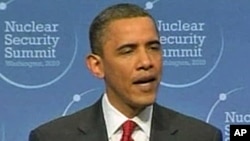President Barack Obama says the nuclear security summit in Washington earlier this week represented a "day of great progress" and part of a larger effort to rid the world of nuclear weapons. But some nuclear security experts say more attention should have been paid to the threat that terrorists pose to the mounting nuclear stockpiles in India and Pakistan.
President Obama met with the leaders of India and Pakistan one day ahead of the summit that focused on how to keep nuclear materials out of the hands of terrorists.
Later at the summit he called for better nuclear security programs.
"I feel confident about Pakistan's security around its nuclear weapons programs," said President Obama. "But that doesn't mean that there isn't improvement to make in all of our nuclear security programs."
Indian Prime Minister Manmohan Singh said his country still has concerns about the potential proliferation of nuclear arms in Pakistan.
"We have been voicing our concerns with regard to the proliferation, the clandestine activities of trafficking," said Prime Minister Singh.
Pakistani Prime Minister Yusuf Raza Gilani says his country's nuclear weapons are well-guarded. But Pakistan has had a tarnished reputation since scientist A.Q. Khan's sale in 2004 of nuclear secrets to Iran, Libya, and North Korea. And a new study at Harvard University finds that Pakistan's small but growing stockpile is the world's least secure from theft or attack.
Arif Rafiq is a long time observer of the Pakistani scene:
"The perception of the nuclear proliferation that began in the 1990s and continued into the early 2000's still exists," said Arif Rafiq. "Pakistan's nuclear weapons are a source of concern for governments across the world because of the instability there and also because of the history of proliferation."
Some experts say the risk is made worse due to the continued development of nuclear materials, and the increase of terrorist activities in South Asia.
Marvin Weinbaum is an analyst at the Middle East Institute:
"Our concern here is that if Pakistan becomes destabilized, if the military reflects this destabilization, that this would present the greatest threat," said Marvin Weinbaum. "There is always a possibility of rogue elements and this is also a matter of some concern as well."
Weinbaum says India and Pakistan could have gotten more attention at the summit, but that would have changed the main focus of the meeting.
"[They] would have served as a distraction from what is the main purpose and that is to build a coalition of forces to act in unity in trying to prevent Iran from moving further in its nuclear program," he said.
Experts say at a time when the Obama administration is trying to improve relations with both South Asian countries, it would have been a difficult balancing act to discuss the U.S. concerns about their mounting nuclear stockpiles . They say it might be the main focus at the next summit in two years.
President Obama Calls Nuclear Security Summit Day of Great Progress




